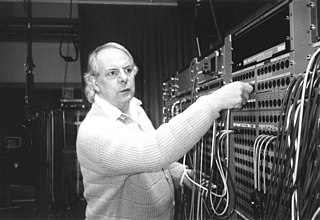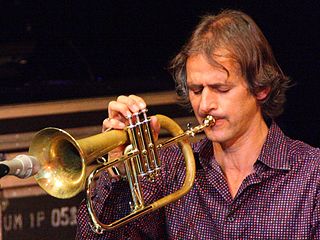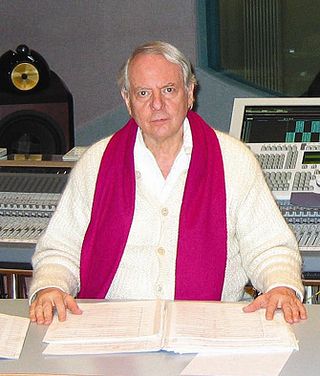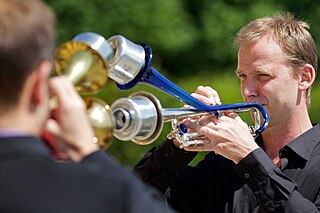
Simon Stockhausen (born 5 June 1967) is a German composer. His parents are the artist Mary Bauermeister and the composer Karlheinz Stockhausen; the musician Markus Stockhausen is his half-brother.

Simon Stockhausen (born 5 June 1967) is a German composer. His parents are the artist Mary Bauermeister and the composer Karlheinz Stockhausen; the musician Markus Stockhausen is his half-brother.

Born in Bergisch Gladbach, Stockhausen received his musical education from his father and various private teachers. He wrote his first compositions as a child and in 1980, he appeared publicly as a synthesizer player in the performance of his father's composition Sternklang. In 1981, he performed as soprano saxophonist at the Teatro alla Scala in the opera Donnerstag aus Licht. After graduating from the Freiherr-vom-Stein-Schule Gymnasium Rösrath in 1986, Stockhausen gave concerts worldwide with his father's ensemble and was involved in the production and composition of electronic music for two operas from the cycle Licht. In 1996 he ended the collaboration with his father.
Since 1982, he has also worked in various ensembles (including Kairos, Aparis and Possible Worlds) with his half-brother Markus Stockhausen. Together with Jo Thönes, they formed the jazz trio Aparis, which gave international concerts and published two CDs at ECM. In 1991, Simon and Markus together composed the piece Köln Music Fantasy for the fifth anniversary of the Kölner Philharmonie and in 1996, the piece Jubilee for the tenth anniversary. After the release of their album nonDuality in 2005 the musical paths of the half-brothers separated. [1]
Since 1991 Simon Stockhausen has been composing for various German ensembles in the field of contemporary music, including the Ensemble Modern and the MusikFabrik. This was followed by jazz compositions and performances as a keyboardist with Lalo Schifrin and James Morrison, among others, with whom he founded the band On the Edge in 2003. Since 1998, he has composed numerous incidental music for plays, including for the Berliner Ensemble, the Schauspielhaus Dortmund, the Staatstheater Mainz, the Schauspiel Frankfurt, the Bad Hersfelder Festspiele, the Düsseldorfer and Kölner Schauspielhaus, as well as the Nationaltheater Mannheim (drama). He worked with directors such as Peter Palitzsch, Burkhard C. Kosminski and András Fricsay.
For the Neuköllner Oper , Simon Stockhausen composed the music theatre piece Rheingold Feuerland based on Wagner Das Rheingold to a libretto by Bernhard Glocks in 2011. [2]
In 1999 he founded the group MIR with Manos Tsangaris – for whom he also realised various theatre music as co-composer – in which the Cologne percussionist Jaki Liebezeit was also involved. He has also performed in a wide variety of formations as a keyboardist, live electronic musician and soprano saxophonist, including with Vince Mendoza, Peter Erskine, Michael Riessler, Péter Eötvös, the WDR Big Band, the Sharoun Ensemble and the Berliner Philharmoniker. In 2004, he founded the band Royce with Christian Weidner. Stockhausen also composed numerous soundtracks for feature films, documentaries and short films, including the cinema documentary Trip to Asia – Die Suche nach dem Einklang and feature films by Israeli film director Amos Gitai.
Stockhausen and an ensemble of musicians put together for the 47th Grimme-Preis on 1 April 2011, designed the musical supporting programme for the award ceremony. For each of the 16 prizes awarded, Stockhausen composed his own music, which referred to the respective prize-winning films. [3]
In the 2012/2013 concert season, Stockhausen was an artist in residence with the Hamburg Symphony and premiered a total of five new works, including a major orchestral piece entitled "Doktrin der Ruhe". [4]
Since 2016, Simon has also been working with his mother, the artist Mary Bauermeister, and composed, among other things, the work Farbrausch for the picture series Farbrausch, which was performed on various occasions. [5]
In his compositional work, Simon Stockhausen makes use of computer technology. He is particularly interested in the potential musicality of sounds and the exploration of sound in all its dimensions. Textures, rhythms and harmonies are derived from noises by sound synthesis and then processed in compositions. Through fundamental processes, e.g. time parameters, dynamic changes through compression and the possibility to play back recordings, recorded sounds are changed, i.e. processed. This approach can be described in musicological terms as "compositional sound synthesis". [6] He uses found sounds as material to create music in which the boundaries between pop, jazz, electronics and new music dissolve. The preparation of the material with the help of compositional sound synthesis has long been part of the composition process of a music that can detach language from its message and make sounds musical.

Karlheinz Stockhausen was a German composer, widely acknowledged by critics as one of the most important but also controversial composers of the 20th and early 21st centuries. He is known for his groundbreaking work in electronic music, having been called the "father of electronic music", for introducing controlled chance into serial composition, and for musical spatialization.

Markus Stockhausen is a German trumpeter and composer. His recordings and performances have typically alternated between jazz and chamber or opera music, the latter often in collaboration with his father, composer Karlheinz Stockhausen.

Licht (Light), subtitled "Die sieben Tage der Woche", is a cycle of seven operas composed by Karlheinz Stockhausen between 1977 and 2003. The composer described the work as an "eternal spiral" because "there is neither end nor beginning to the week." Licht consists of 29 hours of music.

The Helikopter-Streichquartett is one of Karlheinz Stockhausen's best-known pieces, and one of the most complex to perform. It involves a string quartet, four helicopters with pilots, as well as audio and video equipment and technicians. It was first performed and recorded in 1995. Although performable as a self-sufficient piece, it also forms the third scene of the opera Mittwoch aus Licht.
Formula composition is a serially derived technique encountered principally in the music of Karlheinz Stockhausen, involving the projection, expansion, and Ausmultiplikation of either a single melody-formula, or a two- or three-voice contrapuntal construction.

Tierkreis (1974–75) is a musical composition by the German composer Karlheinz Stockhausen. The title is the German word for Zodiac, and the composition consists of twelve melodies, each representing one sign of the zodiac.

Marco Blaauw is a Dutch trumpet soloist known for his work in the field of new music and with Cologne-based contemporary music group Ensemble Musikfabrik. He plays a double bell trumpet, an invention that has allowed for numerous new compositions for trumpet, including those by Ernst von Siemens Music Prize winner, Rebecca Saunders. Blaauw is a consistent faculty member at the Darmstadt Summer Course, the Stockhausen Courses Kürten, the Lucerne Festival, and the Chosen Vale International Trumpet Seminar.

Kathinka Pasveer is a Dutch flautist.

In Freundschaft is a composition by Karlheinz Stockhausen, number 46 in his catalogue of works. It is a serial composition for a solo instrument, first for clarinet, and later arranged by the composer for many other instruments, often in friendship to specific performers.

Originale, musical theatre with Kontakte, is a music theatre work by the German composer Karlheinz Stockhausen, written in collaboration with the artist Mary Bauermeister. It was first performed in 1961 in Cologne, and is given the work number 12⅔ in Stockhausen's catalogue of works.

Sonntag aus Licht is an opera by Karlheinz Stockhausen in five scenes and a farewell, to a libretto written and compiled by the composer. It is the last-composed of seven operas that comprise the cycle Licht (Light). Its stage premiere in 2011 was posthumous, more than three years after the composer's death.

Donnerstag aus Licht is an opera by Karlheinz Stockhausen in a greeting, three acts, and a farewell, and was the first of seven to be composed for the opera cycle Licht: die sieben Tage der Woche. It was written between 1977 and 1980, with a libretto by the composer.

Dienstag aus Licht is an opera by Karlheinz Stockhausen in a greeting and two acts, with a farewell, and was the fourth of seven to be completed for the opera cycle Licht: Die sieben Tage der Woche. It was begun in 1977 and completed from 1988 to 1991, to a libretto by the composer.

Mittwoch aus Licht is an opera by Karlheinz Stockhausen in a greeting, four scenes, and a farewell. It was the sixth of seven to be composed for the opera cycle Licht: die sieben Tage der Woche, and the last to be staged. It was written between 1995 and 1997, and first staged in 2012.

Zeitmaße is a chamber-music work for five woodwinds composed in 1955–1956 by German composer Karlheinz Stockhausen; it is Number 5 in the composer's catalog. It is the first of three wind quintets written by Stockhausen, followed by Adieu für Wolfgang Sebastian Meyer (1966) and the Rotary Wind Quintet (1997), but is scored with cor anglais instead of the usual French horn of the standard quintet. Its title refers to the different ways that musical time is treated in the composition.
Studie II is an electronic music composition by Karlheinz Stockhausen from the year 1954 and, together with his Studie I, comprises his work number ("opus") 3. It is serially organized on all musical levels and was the first published score of electronic music.

Oktophonie (Octophony) is a 1991 octophonic electronic-music composition by Karlheinz Stockhausen. A component layer of act 2 of the opera Dienstag aus Licht, it may also be performed as an independent composition. It has a duration of 69 minutes.

Plus-Minus, 2 × 7 pages for realisation, is a composition for one or several performers by Karlheinz Stockhausen, first written in 1963 and redrafted in 1974. It is Nr. 14 in the composer's catalogue of works, and has a variable performing length that depends on the version worked out from the given materials. The score is dedicated to Mary Bauermeister.

Musik für ein Haus is a group-composition project devised by Karlheinz Stockhausen for the 1968 Darmstädter Ferienkurse. Fourteen composers and twelve instrumentalists participated, with the resulting performance lasting four hours. It was not regarded by Stockhausen as a composition belonging solely to himself, and therefore was not assigned a number in his catalog of works.
Jo Thönes is a German percussionist, Jazz drummer and composer.